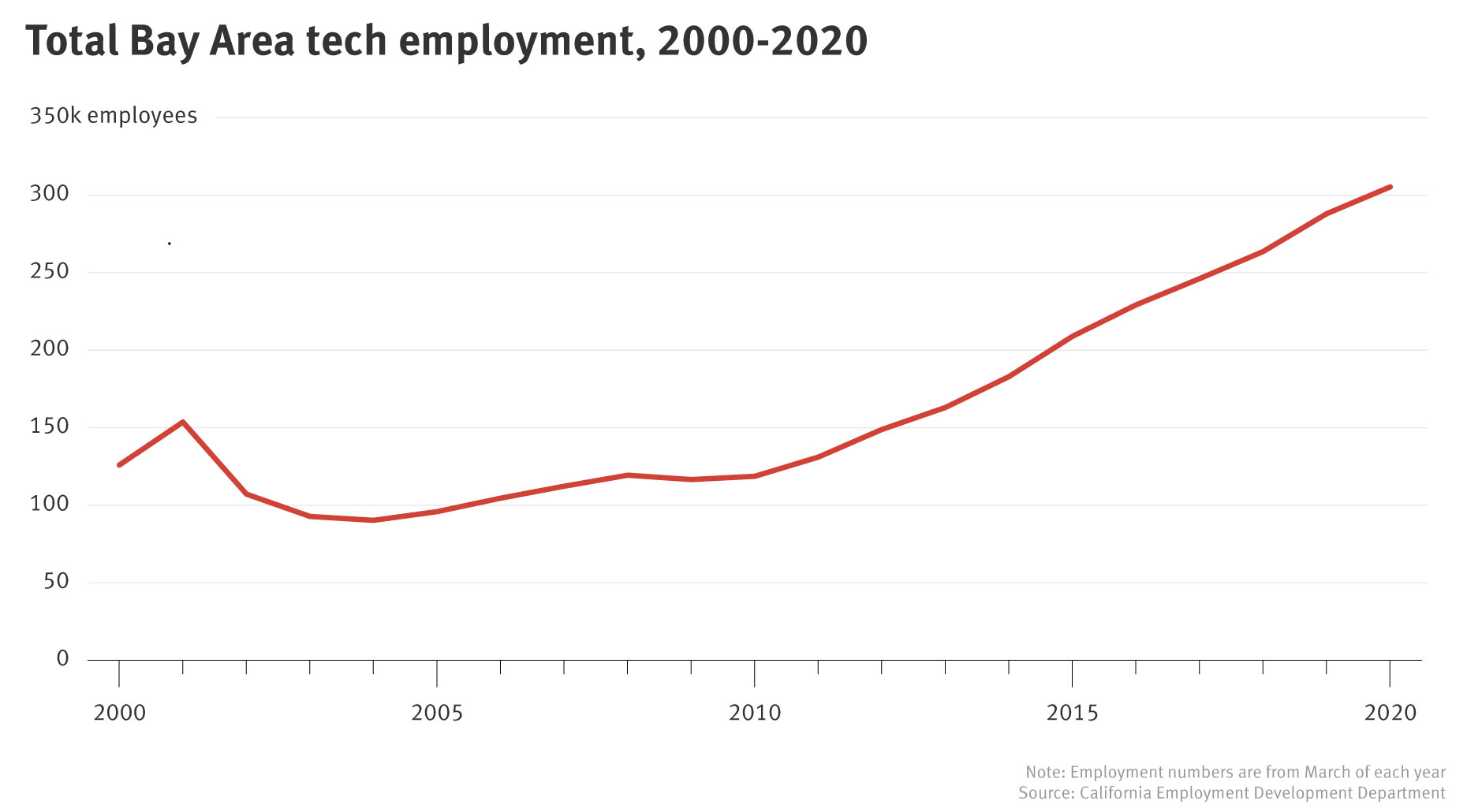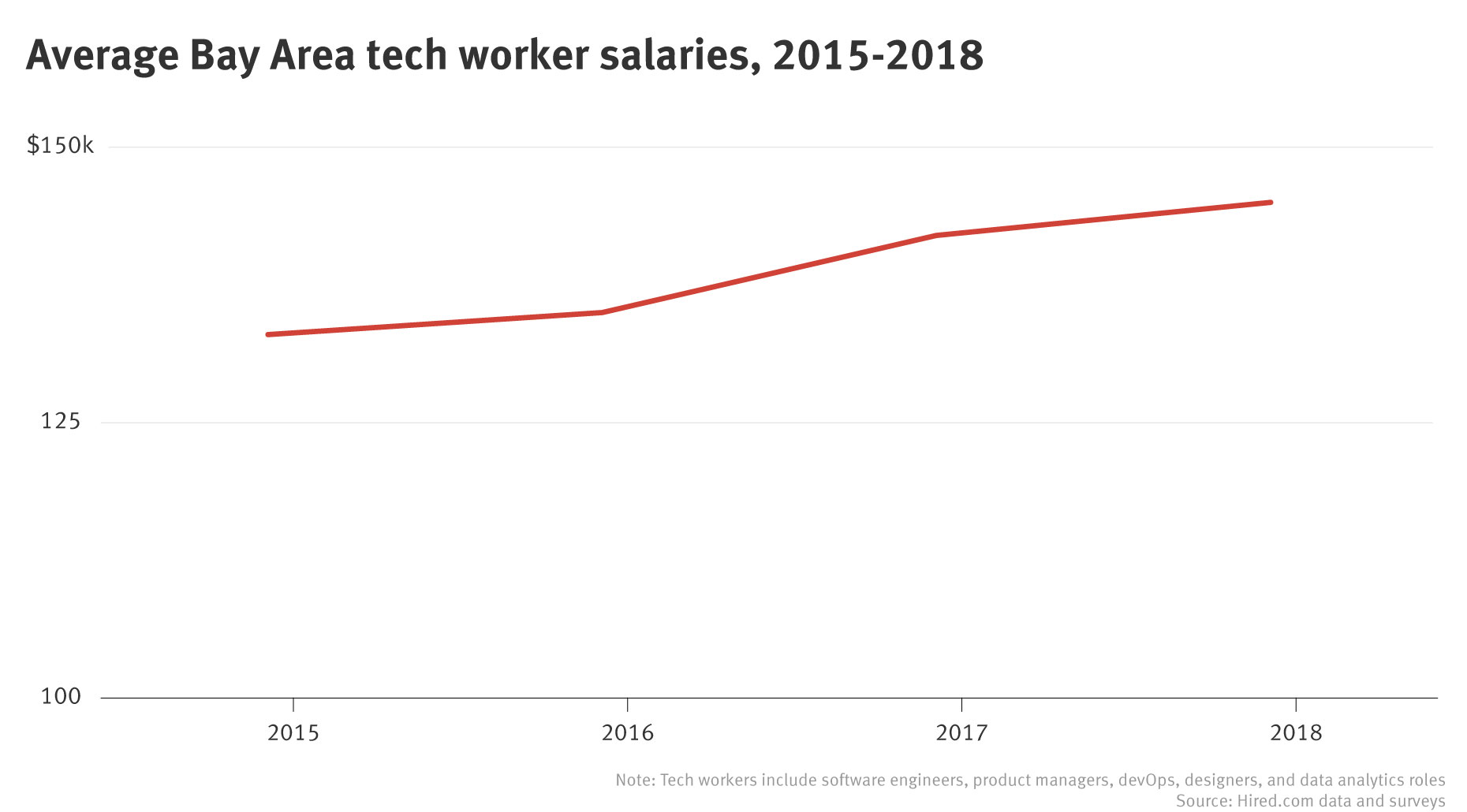
Dreams Upended: Layoffs Shatter Tech Boom
For the past decade, people have flocked to the Bay Area to take advantage of seemingly endless professional opportunities in the tech industry. But the coronavirus pandemic has brought an abrupt end to the hiring bonanza and derailed the careers of thousands of people. While the tech sector might be better positioned than many industries to recover, it is unclear how long a recovery will take.
Tim McLaughlin cheered alongside doctors and nurses at an Oakland, Calif., children’s hospital one evening in late April as his 3-year-old son rang a bell to celebrate major progress with his cancer treatment. The next day, McLaughlin opened his email to find scooter startup Lime had laid him off.
McLaughlin, a 43-year-old Missouri native who found work in the tech industry after taking computer coding classes, is one of the tens of thousands of people who have seen their professional dreams shattered overnight.
The Takeaway
Powered by Deep Research
In the last decade, ambitious people from around the world have flocked to Silicon Valley, drawn by the seemingly endless professional opportunities and the easygoing lifestyle. Many are now scrambling for new jobs to cover health care costs, pay rent or renew temporary immigration visas. Some have little financial cushion, with cash-strapped startups handing out severance packages that offer little more than a few weeks’ pay.
Major cuts have hit household names including Airbnb, Lyft and Yelp, as well as hundreds of smaller tech firms. Some 430 companies have laid off more than 50,000 employees since early March, according to Layoffs.fyi, a site set up to track the cuts. Uber alone has already laid off more 3,000 employees, with thousands more cuts expected this week.

While the cuts have been steep, it is too early to tell whether they will rival the vast layoffs that resulted from the dot-com crash of 20 years ago, which saw hundreds of thousands of tech jobs eliminated as dubious businesses flamed out and investment dried up. Tech companies in the U.S. cut nearly 300,000 jobs across 2001 and 2002, according to outplacement firm Challenger, Gray & Christmas Inc.
Today, the tech industry is much larger, and has squeezed into nearly every corner of the U.S. economy, from hospitality and education, to finance and real estate. In San Francisco, the tech sector made up about 15% of private sector employment in March, up from 7% in 2000, according to an analysis of data compiled by the California Employment Development Department.
The industry’s sheer size is likely to make the current wave of job losses that much more dramatic, said Ted Egan, chief economist of the San Francisco Office of Economic Analysis. That is especially the case with fast-growing tech companies that hired “on spec,” he said, with an eye toward expansion. Over time, he added, “you’ll see a gigantic amount of layoffs, because the tech industry has hired a gigantic amount of people.”
The cuts are already taking a profound human toll. McLaughlin said he needs to get a job within the next few months so he can afford further treatment for his son. If he doesn’t, he said, he is considering moving from his home in Oakland to a less expensive city, near a good children’s hospital. Wanting more control over his fate, he might start his own business.

Speaking by phone recently from his son’s hospital room, McLaughlin said he knew working for a young company came with risks.
“It’s unprecedented what’s going on. If you’re going to work for a startup that hasn’t figured out how to make money yet, you are rolling the dice. You have to be OK with that. No matter what the situation is, you need to be ready for the worst,” he said.
End of an Era
The job losses have brought an end to a decadelong hiring frenzy in the tech industry. In 2018 alone, more than 50,000 people between the ages 25 and 44 moved to the region to work in tech jobs, more than to Seattle and New York combined, according to the Silicon Valley Institute for Regional Studies, based on U.S. census data. Even in the hot U.S. economy of the last decade, job growth in San Francisco and Silicon Valley hovered at around two to three times the national average.
To compete for workers in a tight labor market, businesses often paid substantial salaries and offered perks including free meals and fitness classes that soon became commonplace. Workers who took jobs at fast-growing companies sometimes did so at reduced salaries in exchange for equity in the business, banking on an eventual payday when the company went public or was acquired. Plenty of businesses failed, but there usually were other jobs.

One of the young people drawn to the region was Sharissa Staples, 25, who grew up just south of Silicon Valley in Monterey, Calif. She was the first person in her family to go to college, where she studied history and ethnic studies. The jobs in her hometown were mostly in hotels and schools, so she moved closer to San Francisco. “It becomes clear the older you get where the jobs are,” she said.
She briefly worked at a hospital, but quit in part because she was afraid of blood. She worked at a nonprofit that helped homeless youth after that, where she explained to volunteers from companies like LinkedIn and Salesforce that they should acknowledge homeless people when they pass them in the street.
Last January, Staples joined a startup, the corporate housing firm Zeus Living. She was the company’s second recruiter, helping it grow from about 90 people to nearly 300. The company later raised $55 million in December from investors such as Airbnb and Comcast. It used the money to lease apartment units around the country that traveling employees could use for monthlong stays.
As the travel industry nose-dived, Zeus laid off a third of its staff in March, including Staples. Zeus gave them two weeks’ severance, another former employee said. It had a second wave of cuts last week.
Staples had been saving up to buy a house in Richmond, Calif., a more affordable alternative to San Francisco and other surrounding towns. She expects to put those plans on hold. She received an unemployment check last week, nearly two months after filing for benefits. She is taking online courses and looking after her grandparents in Monterey as she searches for work.
But competition for new roles is intense. Even prolific recruiters like Google and LinkedIn have said they will hire fewer people this year or pause hiring altogether as they brace for a prolonged downturn.
“You’re competing against so many talented people,” Staples said. “You’re constantly dealing with rejection. It’s hard.”
Underlying Advantages
Despite the shock to the economy, parts of the tech industry could emerge relatively unscathed. Some e-commerce and software companies offer services that are in high demand right now, and many companies can operate with their employees working remotely. That will likely help tech-focused regions like the Bay Area recover more quickly, said Egan, the San Francisco economist. He cited the growing popularity of services such as streaming TV, online meeting platforms and social media.
How soon that recovery will happen is hard to know. “You can safely say the tech boom is over. We’re in a recession,” Egan said. The question “is [whether] this [is] the quarter that is the worst in 100 years, or the next three quarters [will be]?”
In the near term, executives and investors expect the capital going into employee hires to shrivel. Already, the number of postings for new software development jobs around the U.S. was down by one-third compared with the same time last year, according to the job-posting site Indeed.com.
The tech industry has flourished far beyond Silicon Valley, and the layoffs have cut a swath through those places, too. In the three years since Emily Harris joined restaurant software firm Toast as a product analyst in 2017, the company has been expanding at a breathtaking clip. Flush with venture capital, the Boston-based startup swelled from a valuation of about $500 million to nearly $4 billion as its workforce more than quadrupled to over 2,000. Revenue more than doubled last year.
Harris was one of more than 1,000 employees laid off or furloughed last month.

More stress followed when she also lost her part-time position as a singer in the Boston Baroque chorus and her husband was laid off from his job as a liquor salesman.
To conserve cash, Harris started cutting small items from her budget: feel-good online purchases she was making unthinkingly only weeks before. She bought less-expensive food as well: canned goods and generic brands. When she received an alert that her iCloud storage was running low, she spent two hours manually deleting image after image from her phone rather than pay $3 for additional space.
“I don’t think of money as money anymore,” she said last week. “I look at it as weeks of survival.”
But Harris received good news on Monday: a job offer for a marketing operations role at a digital marketing startup in Boston. She has accepted, she said.
Losing a Dream Job
McLaughlin, the former Lime employee, set out to remake his career two years ago in order to get a job in tech.
After moving to the San Francisco Bay Area 20 years ago, he spent much of the last decade running a popular guided bike tour business in San Francisco, leading tourists past popular sites like the Castro Theatre and the Victorian homes in Alamo Square. It was a top-rated activity on TripAdvisor. But as competition intensified, he looked to change course. McLaughlin sold the business in early 2018.
He spent the next year at home in Oakland with his newborn son, taking online classes on data analysis, where he learned the coding languages SQL and Python. “I wanted to adapt to the new world out there,” he said. McLaughlin searched for jobs in the tech industry where he could apply his new skills to areas that interested him, such as improving cities. He wanted to help reduce car traffic and pollution.
He landed an operations job at Uber last spring, which had a new bike and scooter rental division that was planning to expand into Oakland and San Jose, Calif. At first, McLaughlin, who grew up an hour west of St. Louis, said he “felt like a fish out of water” at the tech giant. He didn’t understand the jargon. He kept hearing acronyms like “TLDR” (short for “too long, didn’t read”), and noticed sentences peppered with words like “aligned” or “leverage.” But he was a quick study. “I know what words to use to make myself sound like I’m in the crowd,” he said.
Two months after joining Uber, McLaughlin’s young son was diagnosed with an aggressive form of cancer called rhabdomyosarcoma. He needed heavy doses of chemotherapy, radiation and surgery to shrink a tumor in his stomach. McLaughlin and his wife, who had paused her work on a doctorate in education policy at University of California, Berkeley, were expecting another baby.
Meanwhile, Uber reversed course on bringing scooter rentals to Oakland. Last fall, Uber laid off McLaughlin, along with more than 1,000 other employees, sending him scrambling to find a new job so he could have health insurance to cover his son’s treatments. He used connections he had made at Uber to quickly get a similar job at Lime, a scooter rental firm backed by more than $700 million from the likes of Google parent Alphabet and venture firm Andreessen Horowitz.
McLaughlin loved the job at Lime. He was on a team of operations managers overseeing fleets made up of a couple thousand scooters in Oakland.
At the start of this year, Lime faced pressure to cut staff. The company, which lost hundreds of millions of dollars in 2019, had failed to raise more venture capital. Lime laid off about 100 people in January, but McLaughlin was spared. His son’s health started improving as his tumor shrank. Doctors prescribed a lighter radiation treatment.
After the coronavirus started shutting down cities in early March, Lime pulled its scooters off the streets. Little revenue came in the door, sending the company searching for more cuts. McLaughlin didn’t think he would be let go. He was contributing heavily to internal data analysis tools the company was developing.
On April 29, Lime’s then-CEO Brad Bao emailed staff: “I’m sorry that we have no choice but to say goodbye today to about 80 employees,” McLaughlin among them.
McLaughlin said the chances of finding a new role at a tech company are “fairly slim” for him at this point. “Maybe I’ll get lucky and get a job—maybe,” McLaughlin said. But last week he feared his prospects were shrinking as layoffs piled up. “Today, Airbnb lays off 1,900 people. That’s another 1,900 people that don’t have a job.”
Cory Weinberg is deputy bureau chief responsible for finance coverage at The Information. He covers the business of AI, defense and space, and is based in Los Angeles. He has an MBA from Columbia Business School. He can be found on X @coryweinberg. You can reach him on Signal at +1 (561) 818 3915.